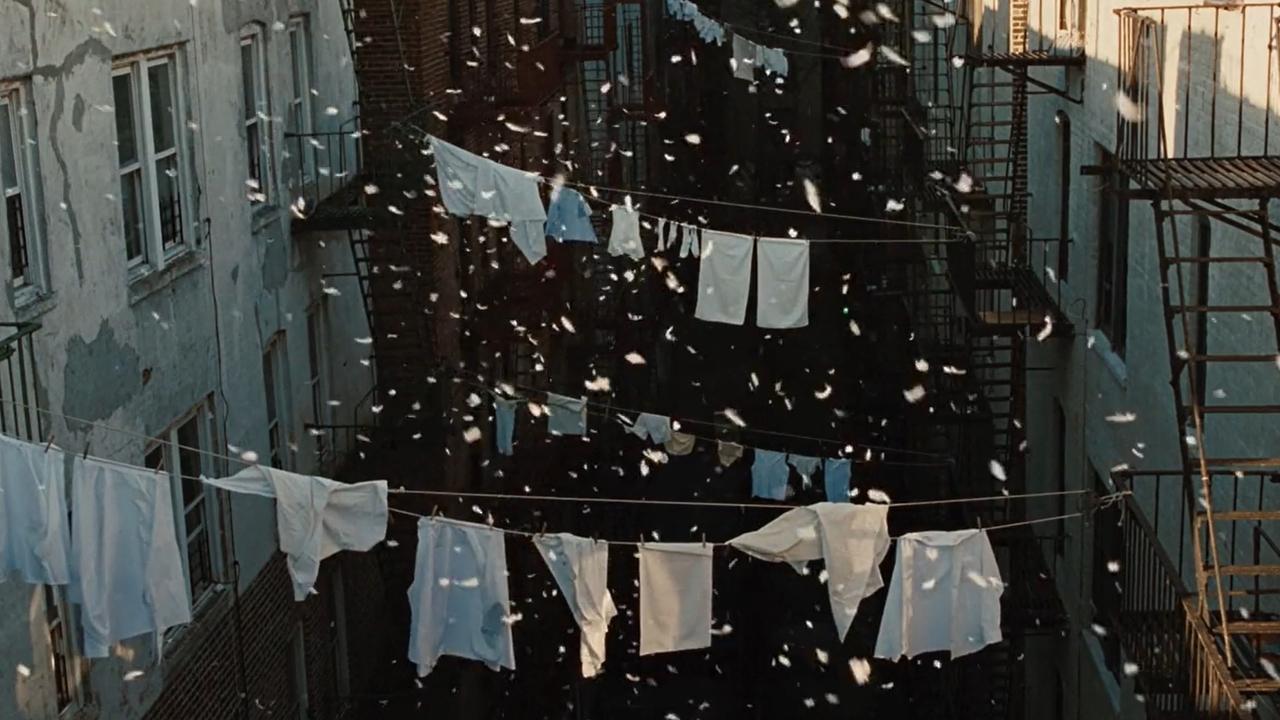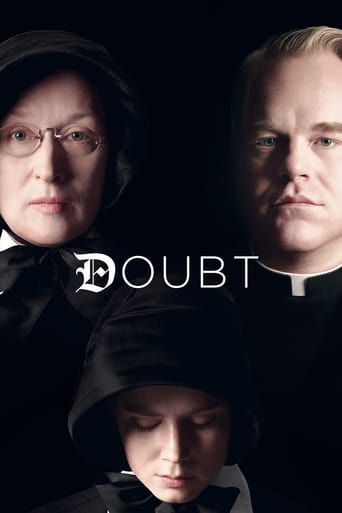

Another overated film. Don't believe the hype.Poor ending. Nobody even talks to the boy? Evidence? Police? If you want to waste your time put it on.
... View MoreFirst of all I'd like to say that it's a serious and thought provoking film, where talented actors like Meryl Streep and Philip Seymour Hoffman play. The idea is to show how differently people live through the period of doubt, when they have only suspections but no evidence. The actors' play is so realistic, that while watching the film you can't but take the position of one of them, as the film goes. But only in the end we also have doubts and have to choose whom to trust, because no truth is said, the ending is open. After watching this film you feel troubled, there're so many questions and no evident answers. The atmosphere of the film coincides with the inner state of characters and viewers, it's dark, windy, oppressing. I didn't like neither the character nor the play of Amy Adams, in my opinion she's too meek, she can't choose whom to believe and her role in the story isn't very clear. In general, the film is intriguing, you need to watch it very attentively, catching all the changes of the characters' thoughts and emotions, though it's not really psychologically comfortable to watch oppressing films like this one.
... View MoreDoubt makes you recheck the seemingly hard facts, the evidence, to scroll a particular episode several times from different angles, to remember words, to repeat them, to solve a particular emotion. And doubt again. Does the question of any right to maim the lives of others, if it is baseless and unsubstantiated? "Doubt"is a film by American Director John Patrick Shanley. The atmosphere of the film nervously suspicious, there are many doubts. Black-brown, dark, almost no bright colors. The story is about a headmistress of the closed Church school, Eloise (Meryl Streep), a woman devoted to the Lord and his principles. Father Flynn (Philip Seymour Hoffman), is a man with a questionable, but not a sinful past, a loving and understanding children. The action takes place in 1964 in the United States. The new pastor of the Church, is a teacher in the school at the Church, father Flynn with all his progressive vision about a new Church, close to the people, makes the headmaster look at him with caution, with a certain distrust. The themes of his sermons sometimes had a strange subtext! Once, one of the sisters becomes a witness to a situation that casts doubt on the reputation of father Flynn. From this moment the quiet film turns into an acute psychological drama that keeps in tension until the credits roll. Throughout the movie Eloise lost in a vague doubt, suspecting father Flynn, the priest at the school, in the depraved actions with the only black student of the school. She doesn't share her suspicions directly, but severely punishes all school teachers to report any oddities in the attitude of the priest. She goes too far with her suspicions, without a single evidence strongly believes in the guilt of father Flynn. Young and naive sister James looks completely confused, she didn't know what to believe. The saddest thing is that all of these events come from good intentions, evil must be punished, but does it? Fascinated, sister Eloise had forgotten that any doubt has two options, and only one of them is correct, but what? Fifty-fifty. The priest in the end cannot withstand such pressure and voluntarily leave the school. And only after a certain time after that, sister Eloise confesses to sister James that she had no evidence against the priest, and again her heart's not in it, and whether it was received... In fact, the denouement of the film still remains a mystery. Was father Flynn guilty or not - it is not clear, the Director has left us his own question - what do you think? Who is right and who is wrong? We have to find out the answer to this question... The film is good. In all senses. Just watch it!
... View MoreThere hasn't been many films since Doubt that I can say have impressed me as much. This film is a masterpiece, from the editing, to the cinematography, to the performances. The film is a hurricane of character, all portrayed masterfully by the actors/actresses involved. Meryl Streep proves once again that she is a master of her craft, and like her character, is a force to be reckoned with. Phillip Seymour Hoffman is brilliant as her match, giving a terrifyingly conflicted performance. Seeing these two face off is like watching a cage match. They have no need to carry the film on their own however, as Amy Adams, Viola Davis, and the various child actors go above and beyond in their supporting roles. The attention to the smallest detail in every scene is fantastic; every scene has a purpose for being there.The screenplay and the way it is performed by its actors is exhilarating to witness, I find more entertainment and excitement in it than most recent blockbusters. It's one of those films I never get sick of, and definitely need to watch once or twice a year. Highly recommended if you appreciate the art of expertly crafted screenplays and nuanced performances.
... View More